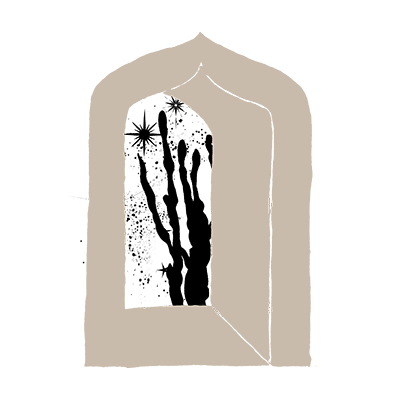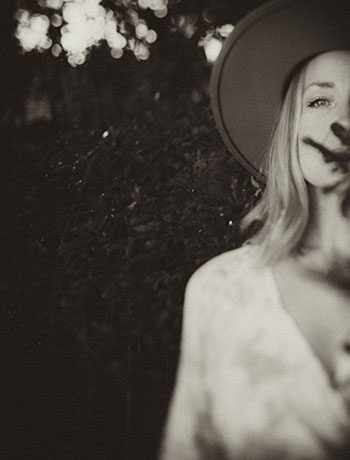I left Portland for the desert one week ago. It was three days of driving that I hardly remember, except for rare bursts of aliveness when the land unfolded herself for me, holding my attention with wide swaths of white-peaked mountains, the sweet scent of warm sap, or the many-jointed arm of a river stretching out, bubbling up from the belly of the Earth and diving back into her, changing the landscape, offering life or taking it with her.
Here, on the western border of Arizona, the land is a different animal than the wet, generous thing saturated with life-giving water of the Pacific Northwest. Here, the land quickly takes what cannot survive of its own volition. The beauty is unforgiving, demanding as much as it offers.
This is the land of my origin. It’s where the women in my family still live, and I’ve come home for the summer to see if I can understand a little more about where I come from — about who I come from. The laughter of these women, the sounds they make while cooking together in the kitchen, the shapes of their hands and the way they mother their children… all are part of me, though it has for years felt like the frayed pieces of a cloth I have unwrapped myself from, moving further and further away, all in an effort to know the sound of my own breathing, the sound of my name on the lips of people who do not remember a freckled, knock-kneed version of me.
In Portland, I’m far removed; I look into my family like a visitor at an aquarium: close enough sometimes to have the illusion of being in their world, but quite desensitized to the currents that impact the aquatic life I’m witnessing. Part of returning to the place I come from is to inject myself into the sometimes uncomfortable reality of my origin; it’s an experience of a world I don’t feel much a part of anymore, and which in many ways I’m quite comfortable being removed from.
Except for when I’m not. Except for when longing for belonging clutches my heart like a cold, hungry hand asking to be fed. It is a hand not unlike the desert I come from: parched, eager for nourishment, but easily overwhelmed.
So last night, with the expansive switchboard sky above me, all the stars plugged in and throbbing with light, my shoulders stinging from a fresh sunburn, the question emerged:
Can the role we play in our families [of origin] give us insight into who we are — or evolve into over time — in our romantic relationships?
“Isn’t it interesting,” I said to a friend recently as we bemoaned our family-of-origin wounding, “that all our damage tends to get done in the first few years of our lives, by people who more or less get totally let off the hook. And then we spend the rest of our lives going around to various relationships being like, ‘So hey. I know you had nothing to do with all the shit that happened to me when I was younger and we didn’t know each other, but would you mind if I, like, play out absolutely all of the psychodrama with you? And while we’re at it, would you mind healing basically all of it for me? Mmkaythanks.'”
It’s an ironic — but hopeful — scene: we are given many chances to rewire our internal mechanism in romantic relationships. Love can be like a lacquer filling in the gaps, offering a smooth and refined surface, but deep within, reminding us of the chasm of yearning that exists in all of us beneath the shiny surface of our external being.
If we’re fortunate and conscious, relationships can form tiny, two-person colonies of healing. Done with honor and regard for the tender process of unfolding intimacy, romantic connecting becomes the stage where we safely play out the confusion of our earliest unknowns: how we fit into a group, the treatment we allow from others, what informs our understanding of how the machine of co-existence functions (or doesn’t). Our partners both support and challenge who we might become; in relationship, we come face to face with the whole person we are evolving back into over the course of our lives.
The focus is often on mother/father dynamic. The reasons are obvious; Mother/Father wounds (we all have them, blessed though our parents and all their effors may be) are the most commonly repeated in romantic relationship. There is never ever a client who does not at some point have the Ohmygod, this is my relationship with my mother/father playing out moment over the course of our work together.
But what about relationships with other family players? Brothers, sisters; aunts & uncles. Even the dynamically complicated relationships with close family friends. If we pay attention to the network of connection we were born into — and who we become when operating within the folds of of that system — we can gain an enlightening perspective on the types of dynamics we repeat when romantic relationship begins to really go deep.
I believe we’re born with the echo of a memory of ourselves. As an astrologer, I watch the lights of the heavens reflecting in the bodies and hearts of my clients, and I’ve not yet managed to escape my own heavenly blueprint (not that I’d want to). I love relationship for the bravery it asks of us; the ones we love call to us throughout our lives in the sparks of Knowing we encounter in eyes that see us clearly.
True intimacy always requires profound honesty. It offers a reason to dig through the contents of our being for all the hungry hands asking to be fed; all the wounds trying to be healed. The cosmos experiencing itself through us, lifetime over lifetime, as we move through the dance of loving beneath stars speaking to us from a long-ago past.


